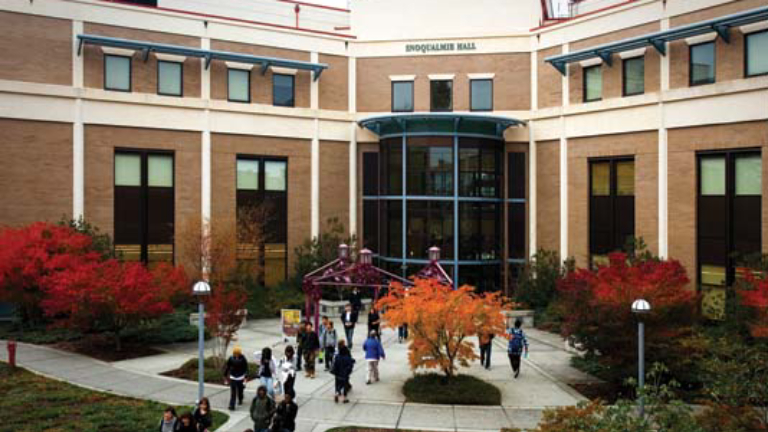Customer Story
Edmonds Community College
Founded in 1967, Edmonds Community College helps students access educational and career opportunities in a supportive environment that encourages success, innovation, service and lifelong learning. The college spans fifty acres in the heart of a northern Seattle suburb and employs more than 1,600, contributing to the vitality of state and local economies. Edmonds has 21,000 students enrolled in Associate’s Degree programs, career training, adult literacy, or continuing education classes.

Quick Facts
- Location
- Seattle, Washington
- Industry
- Higher Education
- Products
- Controls • Chillers • Air Handlers • Comprehensive Chilled Water Systems
- Topics
- Sustainability • Innovation • Efficiency • Cost-Saving • Optimal Comfort
- Services
- Energy Analysis & Monitoring • Energy Efficiency Contracting • Upgrading

Summary
Founded in 1967, Edmonds Community College helps students access educational and career opportunities in a supportive environment that encourages success, innovation, service and lifelong learning. The college spans fifty acres in the heart of a northern Seattle suburb and employs more than 1,600, contributing to the vitality of state and local economies. Edmonds has 21,000 students enrolled in Associate’s Degree programs, career training, adult literacy, or continuing education classes.
Challenge
For Edmonds Community College (EdCC), it was like the perfect storm. The college had lost 30 percent of its funding due to state budget cuts, utility costs were continuing to increase and its aging systems were in need of upgrade, as exemplified by a recent boiler failure. At the same time, the community college adopted a new bottom-up sustainability initiative supported by its students and staff. EdCC joined other colleges and universities in committing to the elimination of net greenhouse gas emissions by becoming a signatory of the American College & University Presidents’ Climate Commitment (ACUPCC). Signatory institutions agree to complete an emissions inventory, set a target date for becoming climate neutral, take immediate steps to reduce greenhouse gas emissions and integrate sustainability into its educational experience. The college believes that exerting leadership in sustainability is an integral part of its mission and that doing so will reduce its long-term energy costs, attract excellent students and faculty, help obtain new sources of funding, and increase the support of alumni and local communities. The community college sought to upgrade systems and improve comfort levels of its twenty-two building campus, while staying true to its sustainability commitments, energy efficiency goals and budgetary requirements.
Solution
EdCC expanded its existing service-based relationship with Trane to collaborate on ways to improve overall campus efficiency. The college’s Facilities Planning & Operations Department worked with Trane to incorporate the ACUPCC-required Green House Gas Audit into its existing Investment Grade Audit to create a baseline, identify improvement opportunities throughout the campus and prioritize projects for the school’s emissions reduction plan. Through an Energy Savings Performance Contract (ESPC), a three-phase project plan was rolled out. Learning of energy conservation grants available from the State of Washington, Trane helped EdCC secure matching dollars to fund the improvement projects.
HVAC and lighting upgrades conserve energy
To improve fuel efficiency, EdCC’s central plant boilers were replaced with modular, high-efficiency units; the cooling tower and central plant chilled water system were optimized; outdoor air dampers were repaired; and HVAC systems were upgraded in several buildings, including the gymnasium and IT server room. Lighting was upgraded in parking lots, buildings and batting cages for additional energy savings.
Server virtualization reduces operating costs
The aging servers in the college’s IT department required additional cooling capacity, were expensive to maintain and were costly to replace, as was needed every four to six years. Wishing to migrate from physical to virtual servers, the college challenged Trane to incorporate an IT upgrade into the project. Eighty-six low-capacity eight-blade servers were replaced with a small number of high-capacity virtual servers, significantly reducing energy and cooling demand.
Controls, active metering aid energy management
Trane direct digital control upgrades and retro-commissioning allow increased efficiency campus-wide. Variable Frequency Drives (VFDs) were installed in place of the inlet guide vanes on multiple fans, resulting in significant energy savings and greatly increased control. A Trane Adaptive Frequency™ Drive (AFD) changes the speed of the chiller compressor motor to match the varying building load, thereby reducin operational cost and electricity consumption. Active metering, installed throughout the campus, provides data for the college’s energy management system (EMS). The EMS software allows the college to forecast energy demand, predict energy usage spikes, analyze trends and manage its dimmable LED lighting control system at each fixture.
Results
Energy efficient upgrades at Edmonds Community College, made possible by a Trane Energy Saving Performance Contract and over $2 million in utility incentives and grants from the State of Washington, have allowed the college to achieve its sustainability, energy efficiency and budgetary objectives. The energy conservation measures have resulted in an annual energy savings of $253,000 and a 1.4 million annual kWh savings, as well as $79,000 in annual operational savings due to its server virtualization. The project has resulted in a reduction of 3.9 million lbs of CO2 a year. "The results of the energy efficiency upgrades have exceeded our expectations," said Kevin McKay, EdCC vice president finance and operations. "These kinds of projects take a good team and everybody has to play together. In this case, we had the college’s staff, along with several state agencies and multiple vendors. Trane proactively managed all the relationships, which made the project go very smoothly."
About Edmonds Community College
The college campus includes twenty-eight computer labs, nine science labs, three eateries, two greenhouses, a digital recording studio, an art gallery, a theater, a childcare center, a gym, an on-campus residence hall, and a university satellite center for Central Washington University.
